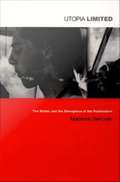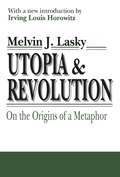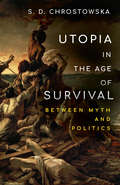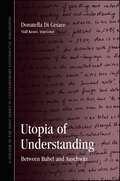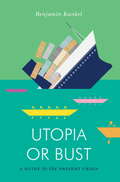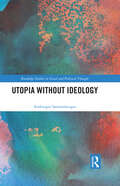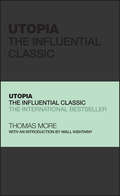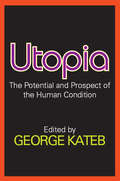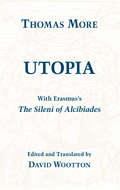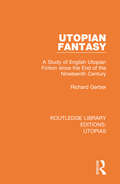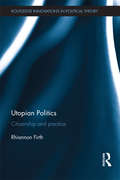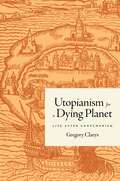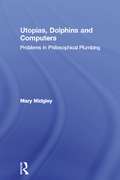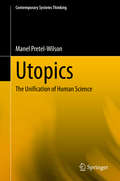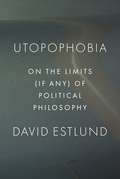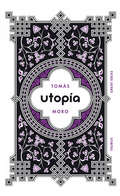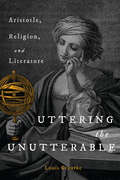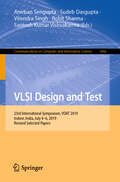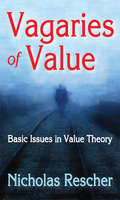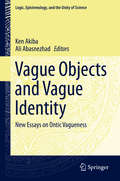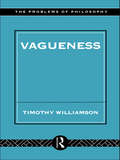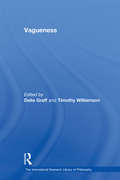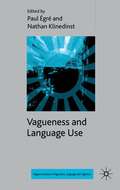- Table View
- List View
Utopia Limited: The Sixties and the Emergence of the Postmodern
by Marianne DekovenUtopia Limited is an original, engaging account of how postmodernism emerged from the political and cultural upheaval of the 1960s. Marianne DeKoven argues that aspects of sixties radical politics and culture simultaneously embodied the full, final flowering of the modern and the beginning of the postmodern. Analyzing classic sixties texts, DeKoven shows where the utopian master narratives underlying the radical and countercultural movements gave way to the "utopia limited" of the postmodern as a range of competing political values and desires came to the fore. She identifies the pivots where the modern was superseded by the nascent postmodern: where modern mass culture was replaced by postmodern popular culture, modern egalitarianism morphed into postmodern populism, and modern individualism fragmented into postmodern politics and cultures of subjectivity. DeKoven rigorously analyzes a broad array of cultural and political texts important in the sixties--from popular favorites such as William S. Burroughs's Naked Lunch to political manifestoes including The Port Huron Statement, the founding document of SDS (Students for a Democratic Society). She examines texts that overtly discuss the conflict in Vietnam, Black Power, and second-wave feminism--including Frances FitzGerald's Fire in the Lake, James Baldwin's The Fire Next Time, and Shulamith Firestone's The Dialectic of Sex; experimental pieces such as The Living Theatre's Paradise Now; influential philosophical works including Roland Barthes's Mythologies and Herbert Marcuse's One-Dimensional Man; and explorations of Las Vegas, the prime location of postmodernity. Providing extensive annotated bibliographies on both the sixties and postmodernism, Utopia Limited is an invaluable resource for understanding the impact of that tumultuous decade on the present.
Utopia and Revolution: On the Origins of a Metaphor
by Irving Louis Horowitz Melvin J. LaskyThe most comprehensive study of ideology and utopia since Karl Mannheim's work of the 1930s, Utopia and Revolution can be understood as turning classical political theory on its head or, perhaps, inside out. Instead of the usual summary of how English radical theologies contributed to the revolutionary process, Lasky shows how such political theology of the mid-seventeenth century became the backbone of the natural history of revolutionary disasters. In a remarkable feat of scholarship in intellectual history, Lasky charts the course of this historic entanglement over some five turbulent centuries of Western history. In so doing, he traces the ideological extension of the human personality through the writings of political theorists, philosophers, poets, and historians.
Utopia in the Age of Survival: Between Myth and Politics
by S. D. ChrostowskaA pathbreaking exploration of the fate of utopia in our troubled times, this book shows how the historically intertwined endeavors of utopia and critique might be leveraged in response to humanity's looming existential challenges. Utopia in the Age of Survival makes the case that critical social theory needs to reinstate utopia as a speculative myth. At the same time the left must reassume utopia as an action-guiding hypothesis—that is, as something still possible. S. D. Chrostowska looks to the vibrant, visionary mid-century resurgence of embodied utopian longings and projections in Surrealism, the Situationist International, and critical theorists writing in their wake, reconstructing utopia's link to survival through to the earliest, most radical phase of the French environmental movement. Survival emerges as the organizing concept for a variety of democratic political forms that center the corporeality of desire in social movements contesting the expanding management of life by state institutions across the globe. Vigilant and timely, balancing fine-tuned analysis with broad historical overview to map the utopian impulse across contemporary cultural and political life, Chrostowska issues an urgent report on the vitality of utopia.
Utopia of Understanding: Between Babel and Auschwitz (SUNY series in Contemporary Continental Philosophy)
by Donatella Ester Di CesareSpeaking and understanding can both be thought of as forms of translation, and in this way every speaker is an exile in language—even in one's mother tongue. Drawing from the philosophical hermeneutics of Martin Heidegger and Hans-Georg Gadamer, the testimonies of the German Jews and their relation with the German language, Jacques Derrida's confrontation with Hannah Arendt, and the poetry of Paul Celan, Donatella Ester Di Cesare proclaims Auschwitz the Babel of the twentieth century. She argues that the globalized world is one in which there no longer remains any intimate place or stable dwelling. Understanding becomes a kind of shibboleth that grounds nothing, but opens messianically to a utopia yet to come.
Utopia or Bust: A Guide to the Present Crisis
by Benjamin KunkelAfter the financial crash and the great recession, the media rediscovered Karl Marx, socialist theory, and the very idea that capitalism can be questioned. But in spite of the publicity, the main paths of contemporary critical thought have gone unexplored outside of the academy. Benjamin Kunkel's Utopia or Bust leads readers - whether politically committed or simply curious - through the most important critical theory today. Written with the wit and verve of Kunkel's best-selling novel, Indecision, this introduction to contemporary Leftist thinkers engages with the revolutionary philosophy of Slavoj i ek, the economic analyses of David Graeber and David Harvey, and the cultural diagnoses of Fredric Jameson. Discussing the ongoing crisis of capitalism in light of ideas of full employment, debt forgiveness, and "fictitious capital," Utopia or Bust is a tour through the world of Marxist thought and an examination of the basis of Western society today.From the Trade Paperback edition.
Utopia without Ideology (Routledge Studies in Social and Political Thought)
by Ambrogio SantambrogioThis book explores and proposes original definitions of central terms in political sociology and social theory, including political culture, imaginary, ideology, and utopia, in a manner that renders the individual definitions consistent with one another as part of a single and general conceptual framework for understanding social action. Through a Weberian distinction between means, ends, and values, together with the thought of Alfred Schütz and phenomenological sociology more generally, it sheds light on the ways in which the book’s key concepts make sense of social action, advancing the view that, rather than some promised land or aspiration, utopia is a project of broad and far-reaching collective action realized in its own enactment. As such, the book will appeal to scholars of social theory, political sociology, and political theory.
Utopia, Limited
by Anahid NersessianWhat is utopia if not a perfect impossible world? Anahid Nersessian reveals the basic misunderstanding of that ideal. Applying the lessons of art to the rigors of life on an imperiled planet, she enlists the Romantics to redefine utopia as an investment in limitation--not a perfect world but one where we get less than we hoped but more than we had.
Utopia: The Influential Classic (Capstone Classics)
by Sir Thomas MoreWhat we can learn from a Renaissance nowhere In 1516, a book was published in Latin with the enigmatic Greek-derived word as its title. Utopia—which could mean either “good-place” or “no-place”—gives a traveler’s account of a newly discovered island somewhere in the New World where the inhabitants enjoy a social order based purely on natural reason and justice. As the traveler describes the harmony, prosperity, and equality found there, a dramatic contrast is drawn between the ideal community he portrays and the poverty, crime, and often frightening political conditions of 16th century Europe. Written by Sir Thomas More (1477–1535)—then a rising intellectual star of the Renaissance and ultimately the advisor and friend of Henry VIII who was executed for his devoutly Catholic opposition to the king—Utopia is as complex as its author. In the form of a Platonic dialogue, Utopia explores topics such as money, property, crime, education, religious tolerance, euthanasia, and feminism. Claimed as a paean to communism (Lenin had More’s name inscribed on a statue in Moscow) as often as it has been seen as a defense of traditional medieval values, Utopia began the lineage of utopian thinkers who use storytelling to explore new possibilities for human society—and remains as relevant today as when it was written in Antwerp 500 years ago. Explore the issues like feminism, euthanasia, and equality through Renaissance eyes Early communist tract or a defense of medieval values? You decide. Peer inside the enigmatic mind of the man who dared stand up to Henry VIII Appreciate the postmodern possibilities of Platonic dialogue Part of the bestselling Capstone Classics series edited by Tom Butler-Bowdon, this edition features an introduction from writer, economist, and historian Niall Kishtainy.
Utopia: The Potential and Prospect of the Human Condition
by George KatebAmid the twentieth century's seemingly overwhelming problems, some thinkers dared to envisage a world order governed by utopian proposals that would eliminate--or at least alleviate--the evils of society and secure positive advantages for all human beings. Others found this utopian optimism a hopeless fantasy and predicted a utopian order only repressiveness, boredom, and the impoverishment of human experience. The unique gathering of articles in Utopia vividly demonstrates the tension existing between utopian ideas and their proponents and the severe criticism of their adversaries.Among utopia's enthusiastic supporters, B. F. Skinner outlines the educational practices needed to sustain his concept of utopia, while Margaret Mead sets forth a bold defense of utopian vision in her article "Towards More Vivid Utopias." In active opposition to modern utopian idealism, Ralf Dahrendorf, the prominent German sociologist and politician, compares utopia with a cemetery and criticizes its fixed and uneventful life, and J. L. Talmon predicts that, since utopianism postulates absolute social cohesion, there is no escape from dictatorship in the utopian design. Still another alternative is offered by Zbigniew Brzezinski, who bases his futurist ideology on the trends of technology in the advanced countries of the world, especially the United States. He sees in the conscious application of technical-scientific rationality by an intellectual elite the method by which the promises of modern knowledge can be made good.Underscoring the fact that the utopian tradition can make us look at the real world with new eyes, George Kateb, the editor of Utopia, clarifies the terms of this long-standing debate and offers a thorough analysis of the "strong utopian impetus to save the world from as much of its confusion and disorder as possible." The work is an argument neither for utopian or anti-utopian visions. Rather it shows the possibilities of political norms in advancing the human condition in open societies.
Utopia: with Erasmus's "The Sileni of Alcibiades" (Hackett Classics)
by Thomas MoreWootton's translation brings out the liveliness of More's work and offers an accurate and reliable version of a masterpiece of social theory. His edition is further distinguished by the inclusion of a translation of Erasmus's 'The Sileni of Alcibiades,' a work very close in sentiment to Utopia, and one immensely influential in the sixteenth century. This attractive combination suits the edition especially well for use in Renaissance and Reformation courses as well as as for Western Civilization survey courses. Wootton&’s Introduction simultaneously provides a remarkably useful guide to anyone&’s first reading of More&’s mysterious work and advances an original argument on the origins and purposes of Utopia which no one interested in sixteenth-century social theory will want to miss.
Utopian Communities in America 1680-1880 (Dover Books on History, Political and Social Science)
by Mark HollowayOriginally entitled Heavens on Earth, this book provides an overview of utopian communities in the thirteen colonies and in the United States. It begins with Utopian movements in Europe and explores how the New World provided rich ground where idealistic communities could put down roots. The most successful utopian communities had strong religious precepts and often were controlled by charismatic leaders. United by a common belief system and purpose, members of the community shared their material possessions and worked for what they believed to be a common good. With tongue in cheek humor that reveals the failings of leaders and ideology, the author examines such communities as Ephrata, New Harmony, Brook Farm, the Shaker societies, and many more.
Utopian Fantasy: A Study of English Utopian Fiction since the End of the Nineteenth Century (Routledge Library Editions: Utopias)
by Richard GerberThis book, originally published in 1955 and reissued in 1973, is a study of the flourishing of an ancient literary form which had only recently been recognized and systematically studied as a proper genre – utopian fiction. Beginning with the imaginary journeys of writers like H. G. Wells at the end of the nineteenth century, Professor Gerber traces the evolving themes and forms of the genre through their culmination in the sophisticated nightmares of Aldous Huxley and George Orwell. It is a two-fold transformation: On the one hand, the optimism of social reformers whose visions of the future were nurtured by the theories of Darwin and the triumph of science and industry gradually gives way to the pessimism of moral philosophers alarmed at the power science and technology have put at the disposal of totalitarian rulers. On the other hand, the earlier writers’ dependence on framing and distancing devices for their stories and heavy emphasis on technical details give way to the subtlety of complex psychological novels whose artistry makes the reader a citizen of the tragic worlds depicted.
Utopian Politics: Citizenship and Practice (Routledge Innovations in Political Theory)
by Rhiannon FirthIn the context of global problems such as the economic downturn, escalating inequality, terrorism, resource depletion and climate change, cynicism prevails in contemporary politics, which need not be the case. Utopian Politics confronts a world intensely aware of the problems that we face and sadly lacking in solutions, positing a utopian articulation of citizenship focused on community participation at a grassroots level. By re-examining central concepts and thinkers in political theory, this book re-casts the concepts of utopia and citizenship both as part of the classical philosophical tradition and simultaneously as part of the cutting edge of radical alternatives. This book includes never-before published ethnographic research, interviews and photographs from a range of autonomous UK communities, to show how the boundaries of politics and citizenship can be questioned and proposes an innovative methodology inspired by classical and post-structural anarchism. By considering ideas and practices that are generally considered to be marginal to mainstream political theory and practice, the book encourages readers to think about longstanding and central political debates in an entirely new, and creative way. Utopian Politics will be of interest to students and scholars of political theory, ethics and citizenship.
Utopianism for a Dying Planet: Life after Consumerism
by Gregory ClaeysHow the utopian tradition offers answers to today’s environmental crisesIn the face of Earth’s environmental breakdown, it is clear that technological innovation alone won’t save our planet. A more radical approach is required, one that involves profound changes in individual and collective behavior. Utopianism for a Dying Planet examines the ways the expansive history of utopian thought, from its origins in ancient Sparta and ideas of the Golden Age through to today's thinkers, can offer moral and imaginative guidance in the face of catastrophe. The utopian tradition, which has been critical of conspicuous consumption and luxurious indulgence, might light a path to a society that emphasizes equality, sociability, and sustainability.Gregory Claeys unfolds his argument through a wide-ranging consideration of utopian literature, social theory, and intentional communities. He defends a realist definition of utopia, focusing on ideas of sociability and belonging as central to utopian narratives. He surveys the development of these themes during the eighteenth and nineteenth centuries before examining twentieth- and twenty-first-century debates about alternatives to consumerism. Claeys contends that the current global warming limit of 1.5C (2.7F) will result in cataclysm if there is no further reduction in the cap. In response, he offers a radical Green New Deal program, which combines ideas from the theory of sociability with proposals to withdraw from fossil fuels and cease reliance on unsustainable commodities.An urgent and comprehensive search for antidotes to our planet’s destruction, Utopianism for a Dying Planet asks for a revival of utopian ideas, not as an escape from reality, but as a powerful means of changing it.
Utopias, Dolphins and Computers: Problems in Philosophical Plumbing
by Mary MidgleyWhy do the big philosophical questions so often strike us as far-fetched and little to with everyday life? Mary Midgley shows that it need not be that way; she shows that there is a need for philosophy in the real world. Her popularity as one of our foremost philosophers is based on a no-nonsense, down-to-earth approach to fundamental human problems, philosphical or otherwise. In Utopias, Dolphins and Computers she makes her case for philosophy as a difficult but necessary tool for solving some of the most pressing issues facing contemporary society.How should we treat animals? Why are we so confused about the value of education? What is at stake in feminism? Why should we sustain our environment? Why do we think intelligent computers will save us? Mary Midgley argues that philosophy not only can, but should be used in thinking about these questions.Utopias, Dolphins and Computers will make fascinating reading for philosophers, educationalists, feminists, environmentalists and indeed anyone interested in the questions of philosophy, ethics and life.
Utopics: The Unification of Human Science (Contemporary Systems Thinking)
by Manel Pretel-WilsonThe book consolidates systems thinking as a new world-hypothesis that is already suggesting itself behind the advancement of quantum mechanics and Ashby’s cybernetics. In particular, it shows how Einstein’s misgivings about quantum mechanics boil down to his persistence in defending the principle of contiguity at the root of the modern cosmology and, in relation to neo-cybernetics, the book rediscovers Ashby’s theory of adaptive behaviour enabling a new synthesis between physiology, psychology and ethology that has implications for systems practice. Furthermore, this new “cosmology” comes with a new “anthropology” that informs utopics, the science of utopic systems, and sheds new light on the actual founding fathers of the domain of human science. In particular, the book provides an understanding of how our human world works and how it is being constituted by utopic systems that look into the future to realize something possible. Finally, it points the way to the future unification of knowledge bringing together systems philosophy and systems science given that world-hypothesis is what makes logically possible the development and consolidation of all the different domains of science.
Utopophobia: On the Limits (If Any) of Political Philosophy
by David EstlundA leading political theorist’s groundbreaking defense of ideal conceptions of justice in political philosophyThroughout the history of political philosophy and politics, there has been continual debate about the roles of idealism versus realism. For contemporary political philosophy, this debate manifests in notions of ideal theory versus nonideal theory. Nonideal thinkers shift their focus from theorizing about full social justice, asking instead which feasible institutional and political changes would make a society more just. Ideal thinkers, on the other hand, question whether full justice is a standard that any society is likely ever to satisfy. And, if social justice is unrealistic, are attempts to understand it without value or importance, and merely utopian?Utopophobia argues against thinking that justice must be realistic, or that understanding justice is only valuable if it can be realized. David Estlund does not offer a particular theory of justice, nor does he assert that justice is indeed unrealizable—only that it could be, and this possibility upsets common ways of proceeding in political thought. Estlund engages critically with important strands in traditional and contemporary political philosophy that assume a sound theory of justice has the overriding, defining task of contributing practical guidance toward greater social justice. Along the way, he counters several tempting perspectives, including the view that inquiry in political philosophy could have significant value only as a guide to practical political action, and that understanding true justice would necessarily have practical value, at least as an ideal arrangement to be approximated.Demonstrating that unrealistic standards of justice can be both sound and valuable to understand, Utopophobia stands as a trenchant defense of ideal theory in political philosophy.
Utopía (Serie Great Ideas #Volumen 18)
by Tomás MoroIdeas que han cambiado el mundo. A lo largo de la historia, algunos libros han cambiado el mundo. Han transformado la manera en que nos vemos a nosotros mismos y a los demás. Han inspirado el debate, la discordia, la guerra y la revolución. Han iluminado, indignado, provocado y consolado. Han enriquecido vidas, y también las han destruido. Taurus publica las obras de los grandes pensadores, pioneros, radicales y visionarios cuyas ideas sacudieron la civilización y nos impulsaron a ser quienes somos. En Utopía, Tomás Moro describió el fantástico escenario de una isla lejana donde la sociedad se ha perfeccionado hasta alcanzar la armonía. Sin embargo, su título literalmente significa «el no lugar», y esta influyente obra no constituía sino un ataque a su propia época, corrupta y peligrosa, y a los defectos de la humanidad. Comentarios sobre la colección Great Ideas:«De veras que la edición es primorosa y pocas veces contenido y continente pueden encontrarse mejor ensamblados y unidos. ¡Qué portadas! Para enmarcar. [...] Ante las "Great Ideas", solo cabe quitarse el sombrero. ¡Chapeau!»ABC «Taurus propone un doble envite con este lanzamiento. Por un lado aumenta su compromiso con el ensayo; por otro, recupera el gusto por la estética. A los volúmenes se les ha proporcionado una portada delicada y cuidada (copian el original británico) que invita a la lectura.»La Razón «Un fenómeno editorial.»The Guardian «Aparte de los contenidos, en general muy bien elegidos, son tan bonitos que si los ven seguro que cae alguno.»El País «Ideas revolucionarias, crónicas de exploraciones, pensamientos radicales... vuelven a la vida en estas cuidadísimas ediciones, muy atractivas para nuevos lectores.»Mujer Hoy «Grandes ideas bien envueltas. De Cicerón a Darwin, esta colección entra por los ojos.»Rolling Stone «Original y bella iniciativa la emprendida por Taurus con su colección Great Ideas.»Cambio 16 «Hay libros inmortales, libros únicos que contienen pensamientos y reflexiones capaces de cambiar el mundo, tesoros en miniatura reagrupados en la colección Great ideas.»Diario de León
Uttering the Unutterable: Aristotle, Religion, and Literature
by Louis F. GroarkeLiterature utters the unutterable, not through logic, not through science, not through argument, but through a pitch of eloquence so pronounced the conscientious reader cannot fail to pay attention.Louis Groarke argues that literature is an honorific term we use to describe texts that are so overpowering they lift us to an encounter with an ineffable ultimate that is beyond logical or scientific explanation. In Uttering the Unutterable he proposes a wisdom epistemology that identifies an experience of transcendence as the defining criterion of literature. Offering four mutually reinforcing definitions of literature in line with Aristotle’s theory of four causes, Groarke compares the experience of reading to Aristotle’s account of philosophical contemplation and maintains that literature has inevitable ethical content. Moving beyond the Aristotelianism of the late Chicago School, Groarke presents a new synthesis that breaks through essentialist stereotypes and contends that literature, like religion, points to an ineffable transcendental, to something beyond what we can adequately explain, prove, systematize, quantify, or enclose in a theory.Uttering the Unutterable explores how Aristotelian philosophy provides the most complete and compelling account of literature for philosophers, literary critics, and theorists.
VLSI Design and Test: 23rd International Symposium, VDAT 2019, Indore, India, July 4–6, 2019, Revised Selected Papers (Communications in Computer and Information Science #1066)
by Rohit Sharma Virendra Singh Sudeb Dasgupta Anirban Sengupta Santosh Kumar VishvakarmaThis book constitutes the refereed proceedings of the 23st International Symposium on VLSI Design and Test, VDAT 2019, held in Indore, India, in July 2019. The 63 full papers were carefully reviewed and selected from 199 submissions. The papers are organized in topical sections named: analog and mixed signal design; computing architecture and security; hardware design and optimization; low power VLSI and memory design; device modelling; and hardware implementation.
Vagaries of Value: Basic Issues in Value Theory
by Nicholas RescherPragmatism's founder, C. S. Peirce, initially envisioned philosophy as a means of rationally validating our beliefs and actions. Afterward, William James changed pragmatism into a way of undermining commitment to rational cogency. With the subsequent turn of various contemporary pragmatisms to relativism and subjectivism, such irrational tendencies have become still more prominent.Vagaries of Value aims to create a version of realistic and rationalistic pragmatism that is systemically viable and does justice to traditional pragmatism's salient insights. Nicholas Rescher strives to return pragmatism to its realistic and objectivistic roots in a detailed survey of issues across the whole board of philosophical thought, action, and evaluation.Rescher argues that the crisis of pragmatism created by today's subjective tendencies should be met by adopting not a revisionary, but a reconstructive understanding of pragmatism, keeping close to its Peircean roots. He argues that such a turning does not mitigate against the pragmatic program's practical orientation, but provides an opportunity for sharpening our understanding of how pragmatism can and should be developed.
Vague Objects and Vague Identity
by Ken Akiba Ali AbasnezhadThis unique anthology of new, contributed essays offers a range of perspectives on various aspects of ontic vagueness. It seeks to answer core questions pertaining to onticism, the view that vagueness exists in the world itself. The questions to be addressed include whether vague objects must have vague identity, and whether ontic vagueness has a distinctive logic, one that is not shared by semantic or epistemic vagueness. The essays in this volume explain the motivations behind onticism, such as the plausibility of mereological vagueness and indeterminacy in quantum mechanics and they offer various arguments both for and against ontic vagueness; onticism is also compared with other, competing theories of vagueness such as semanticism, the view that vagueness exists only in our linguistic representation of the world. Gareth Evans's influential paper of 1978, "Can There Be Vague Objects?" gave a simple but cogent argument against the coherence of ontic vagueness. Onticism was subsequently dismissed by many. However, in recent years, researchers have become aware of the logical gaps in Evans's argument and this has triggered a new wave of interest in onticism. Onticism is now widely regarded as at least a coherent view. Reflecting this growing consensus, the present anthology for the first time puts together essays that are focused on onticism and its various facets and it fills in the lacuna in the literature on vagueness, a much-discussed subject in contemporary philosophy.
Vagueness (Problems of Philosophy)
by Timothy WilliamsonIf you keep removing single grains of sand from a heap, when is it no longer a heap? From discussions of the heap paradox in classical Greece, to modern formal approaches like fuzzy logic, Timothy Williamson traces the history of the problem of vagueness. He argues that standard logic and formal semantics apply even to vague languages and defends the controversial, realist view that vagueness is a form of ignorance - there really is a grain of sand whose removal turns a heap into a non-heap, but we can never know exactly which one it is.
Vagueness (The International Research Library of Philosophy #Vol. 27)
by Timothy Williamson Delia GraffVagueness, volume XX, contains twenty-seven essays, with issues covered including: nihilism, phenomenal sorites, degrees of truth, epistemicism, higher-order vagueness, contextualism, and intuitionism. Written by leading contemporary philosophers, these essays will be of interest to researchers in philosophy of language, philosophical logic, metaphysics and epistemology; as well as those in natural language semantics, artificial intelligence and cognitive science more generally. A substantial introduction written by the editors provides a guide to the topic and to the essays in the volume.
Vagueness and Language Use
by Paul Égré Nathan KlinedinstThis volume brings together twelve papers by linguists and philosophers contributing novel empirical and formal considerations to theorizing about vagueness. Three main issues are addressed: gradable expressions and comparison, the semantics of degree adverbs and intensifiers (such as 'clearly'), and ways of evading the sorites paradox.
